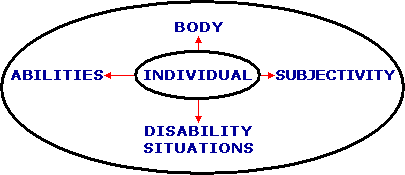
Professor Claude Hamonet's site
The Handitest's site, a handicap
measuring tool in four dimensions
 |
Professor Claude Hamonet's site |
See also :
The Handitest's site, a handicap measuring tool in four dimensions |
 |
 |
 |
 |
 |
 |
 |
 |
|
||
I am from a family of Breton physicians for which the human and social dimension coupled with a devotion to the “sick person” – become, by medical Anglicization of language, the “patient” – constituted the ethics basis of the profession without further consideration. This has conditioned a very early choice (from the third year of medicine in Rennes) of a type of exercise of medicine whose objective is to make evolve not only the medical condition but also the social situation and the vision of the life of the sick or traumatized person and his close relations. I refer to the “physical and Rehabilitation medicine” which, at the time (1959), was only at the beginning of its gestation.
A course as a medical student in one of the first French department of Rehabilitation medicine for victims of poliomyelitis epidemics, put in place by a pioneer, inhabitant of Rennes, Professor Denys Leroy, has been decisive.
As a medical student in Paris, I worked with Professor André Grossiord, another pioneer of the specialty of physical and Rehabilitation medicine and founder of our specialty in France, at the hospital Raymond Poincaré in Garches.
All my training in France, and then in the USA and Quebec (as a fellow, gold medal of the Residents of Paris hospitals) has been turned toward the acquisition of a maximum of medical, technical, organizational and social knowledge in this area, then a wasteland in our country. The determination was to be as useful and effective as possible to the construction of a new global, medical, humanistic and social approach around what we started to call “the Handicap”.
This unusual choice in medicine has led me to many exciting experiences:
Exchange with "emerging" or at war countries have punctuated and fed my thoughts, in particular with Algeria, where I’ve been teaching for 4 years and created the speciality of Physical and Rehabilitation Medicine, but also with Morocco, Tunisia, Gabon, Ivory Coast, Togo, Bosnia and Herzegovina, Lebanon.
The final objective of this is to give an identity and a future to people with disabilities through a new comprehensive, positive and rewarding approach: the identification and measurement of handicap system that I have proposed with the Professor Teresa Magalhaes from the Forensic Institute of the University of Porto, helped by Marie de Jouvencel, Neuropsychologist, and by Professor Louise Gagnon from Montreal. This new comprehensive approach, focusing on the person, forms a consistent medico-social link between health and society. This link is fit to replace the Gordian knot of disability where still prevail the prejudices, the corporatism, bureaucratic stigmatization and poorly understood economic conceptions. The absence of a common and clear language maintains the misunderstandings and incomprehension, and prevents an effective progression. The problem that remains thoroughly is the use of erroneous, incomplete and changing definitions of what is yet simple and a daily concern: the situations of disability.
My activity continues in this direction and the renovated (sixth) edition of the “Que sais-je” series’ persons with disabilities, now Persons in a situation of disability, is a concrete evidence.
But I also decided to face another difficult medical and social problem: the situation of persons with a Ehlers-Danlos Syndrome. It is a genetic disease that undermines the connective tissue and collagen. Its manifestations, discrete to a very great disability, are variable. It is very poorly known by doctors who often confuse with other diseases, neurological, rheumatologic, respiratory, gastroenterological or ENT, which leads to extremely painful diagnosis errors for the persons concerned, too often given of the commentary “it’s all in your mind”. I spend most of my activity as clinician and researcher in the diagnosis, but also the treatment and the social integration of people who are affected, from the Hôtel-Dieu in Paris where I created, in the Department of Physical and Rehabilitation Medicine (Dr J. Y. Maigne), a specialized consultation for this syndrome with the establishment of a treatment program by the physical and rehabilitation medicine.

